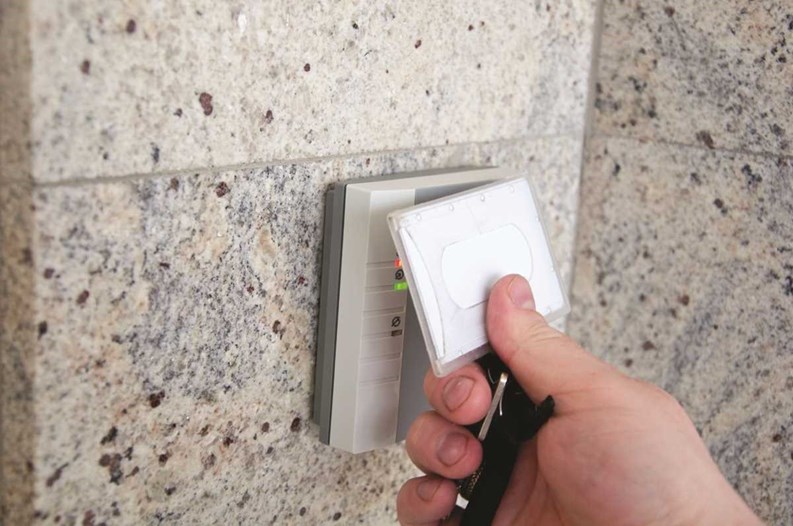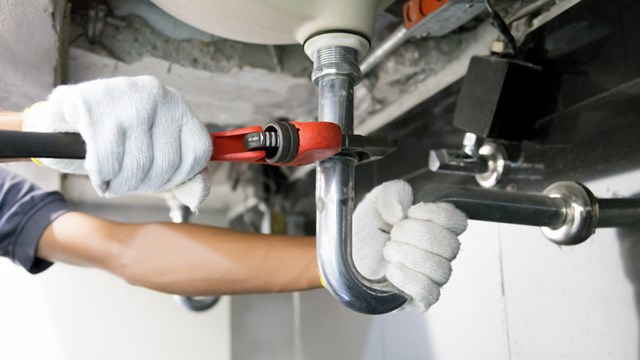While crime rates are steadily decreasing nationwide, multi-unit dwellings are often more difficult to “police” due to the sheer numbers of residents, visitors, delivery personnel and third party workers such as contractors constantly coming and going. As a result, determining how and when a person accesses a building or individual unit becomes a top priority for board members and management companies.
“Florida Condominium Law: Chapter 718.111(5) states that the association has the irrevocable right of access to each unit during reasonable hours, when necessary for the maintenance, repair or replacement of any common elements or of any portion of a unit to be maintained by the association pursuant to the declaration or as necessary to prevent damage to the common elements or to a unit or units,” explains James W. Govin, an attorney with the Fort Lauderdale-based law firm of Saavedra Goodwin.
For many boards and property managers, the real concern centers on property access when the issue isn’t maintenance repair or emergency such as a busted pipe that is flooding adjacent units. To this end, security, as it pertains to doorman and surveillance, comes into play.
“The condition of the property often reflects the security of the property,” says J.R. Roberts, a security risk management expert who has lectured on security nationally for trade associations, property management firms and Fortune 1,000 corporations. “Boards and property managers have to be aware of environmental signs and always have a line of site when it comes to surveillance.”
Who Should Get In?
In South Florida, properties can range from high-rise urban buildings to spread-out suburban condominiums bordering a golf course. As a result ensuring the validity of 'approved' visitors can become a gray issue, especially if the party in question is a non-frequent visitor.
“In Florida, condominiums are directed by Florida Condominium Law,” says Miami- based real estate lawyer Jonathan R. Rubin. “In order to gain access, it has to be an agent of the association. Aside from a governmental third party, such as the police or fire department, a party on the property without association approval, or that of a unit owner, is trespassing.”
While state regulations are in place to guide boards and managers on building access issues, if a problem arises, the building is often held responsible. As such, it is important that all outside workers (e.g., maintenance, security) have liability insurance and workers compensation insurance. Since liability cases are often long and drawn out undertakings, Rubin said boards should consult with their insurance brokers to see what their insurance covers as it relates to liability for personal injury, property damage and theft. It is suggested that boards also consult with attorneys or its property manager as these experts can share experience in guiding on gray area issues such as access to health club and childcare facilities.
When it comes to hiring contractors, Govin says boards must exercise due diligence. To this end, all contractors performing work should be licensed and have insurance in amounts, types and coverage acceptable to the building. Insurance should cover personal injury, property damage, theft and other coverage.
“When it comes to liability, it would depend on an accident, improper enforcement of rules or operations,” says Richard White, who authors the syndicated column “Condo Living” and is a licensed community association manager in South Florida. “I suggest boards talk to an insurance agent. It is suggested that all contractors have liability insurance, workers compensation insurance, properly licensed, work only under proper permits and a host of other requirements depending on the type of work.”
Even with these measures in place, cases aren’t always clear cut. “If, for example, a plumber commits a crime, you can see the lawyerly response coming from a million miles away: it depends,” says Govin. “Premises liability is perhaps a little outside the scope of this article but these issues are intensely fact specific.”
Approved contractors and property managers often enter the common areas of the property without issue; however, gaining access to residential units can present challenges. “Unit owners can make changes and updates inside their unit as longs as it doesn’t affect the common area,” says Rubin. “But if there is damage as a result, then that unit owner is responsible and property managers can gain access if it is an emergency.”
According to Govin, the most common emergency requiring access is plumbing leaks causing damage to another unit or common areas. “I have represented unit owners with leaks, unit owners affected by leaks and associations related to same. I understand and appreciate the nuances of these issues. The association hires a water remediation company to extract water and a contractor to replace portions of the drywall in the affected units,” he continues. “The manager will make requests for access to the unit for the repair work. When those requests are ignored, the issue becomes my problem.”
Absentee Owners
Since South Florida is a “snowbird” region, Govin says many associations have different requirements then, say, a property in Chicago or New York. “Many associations require a key to be on file with the office. A snowbird may not be available to give permission at the time of an emergency. It’s also important to remember that we are talking about emergencies,” he says. “They are impossible to predict and associations and unit owners need to have patience and understanding during a difficult time. I try to stay on top of these issues for my clients and suggest associations with questions about such issues to contact their own community association attorney.”
Roberts notes that all third party personal should be vetted via background checks. “If a board is going to allow vendors access to the property, these vendors have to be approved or properly vetted,” he continues. “Each state differs, but in Atlanta, GA, for example, vendors apply for stickers that they can show guards that signify they are an approved company.”
What's Off Limits?
Aside from Florida condominium law, boards and managers have to jointly agree on policies such as who is permitted in the building and what areas in the building are considered “off limits.” In general, these areas include roofs, boiler rooms, information technology rooms, closets, compactor rooms, building storage rooms (other than tenants), elevator control rooms, superintendent offices and management offices. Conversely, there are areas in condominiums and co-op buildings that are for the exclusive use of unit owners such as the pool, gyms and tennis courts.
While property access is normally an issue directed toward third party vendors, Rubin says a recent amendment to the Florida Condominium Act (Chapter 718.303 of the Florida Statutes) addresses delinquent unit owners. “An association may suspend, for a reasonable period of time, the right of a unit owner, or a unit owner’s tenant, guest, or invitee, to use the common elements, common facilities or any other association property for failure to comply with any provision of the declaration, the association bylaws, or reasonable rules of the association,” the provision states.
If a unit owner is more than 90 days delinquent in paying a monetary obligation due to the association, “the association may suspend the right of the unit owner or the unit’s occupant, licensee, or invitee to use common elements, common facilities, or any other association property until the monetary obligation is paid in full,” the statute states. The statutes, however, note that you cannot restrict common elements needed to access the unit, parking spaces or elevators.
Security Guards—First Line of Defense
For many boards, the presence of a security guard provides a “safe” feeling. While this is true is many cases, and often deters criminals that might be casing the property for theft, the security guard industry has issues. According to Roberts, there are more than three times as many private security guards, an estimated 1.25 million, as police officers in the United States with projected industry earnings exceeding $7 billion dollars annually.
“A big question you have to ask is why does this security guard want to work for you,” says Roberts. “The answer might be to gain access to the property and perpetuate crimes.”
He explains that since there are not currently established federal guidelines governing private security firms, each state determines licensing requirements, background checks and training for security companies and their guards. “These standards vary widely and wildly,” he says, adding that the average turnover rate of employees for a private security company nationally is 300 percent per year.
“With high turnover rates and intense competition, many guard operations seek to maximize profit margins by doing the bare minimum required by states when it comes to pre-employment screening, background checks and training. Some companies even choose to avoid these requirements altogether, gambling that an overburdened and underfunded state regulatory agency may never catch the offender,” says Roberts. “Even when companies are caught in violations, the fines levied are often less than the cost of compliance.”
Virtual Guards
In many cases, boards simply can’t afford to staff security guards and doorpersons 24/7, or at all. As a result, more boards and managers are turning to remote doorman or surveillance cameras, which provide an eye in the sky. What is sometimes referred to an “Internet doorman” or “Cyber Doorman” has received mixed reviews throughout the industry.
Roberts explains that an audio and video feed is sent from a building’s front door to an alarm company’s central location, which might be out of state. The central station’s monitoring employee then becomes responsible for letting in the person whether it is a Federal Express delivery person or a tenant’s aunt. While it can be an effective mode of security, there are loopholes.
Roberts adds that he has evaluated condominium properties that were understaffed with security, or employed remote security. In one instance, homeless people were bathing from the water runoff from the air conditioners in the back of the building. “The board was oblivious to this activity,” he says. “In another case, the back of a building was tagged with gang graffiti, and again the building was unaware of the significance of this criminal element.”
As a result, Roberts is not a “fan” of off-site video. “It’s designed to give a sense of security when it not always is the fact. It’s the delay factor,” says Roberts. “Uniformed, vetted doorman are the best physical security deterrent.”
Whether your HOA opts to beef up your own security protocols, hire staff, or install state-of-the-art electronic security measures is largely dependent on your risk factors, budget, and the priorities of your residents. By doing your homework and weighing the wide array of available options, you can choose the security measure—or measures—that are the best fit for your community.
W.B. King is a freelance writer and a frequent contributor to The South Florida Cooperator.







Leave a Comment